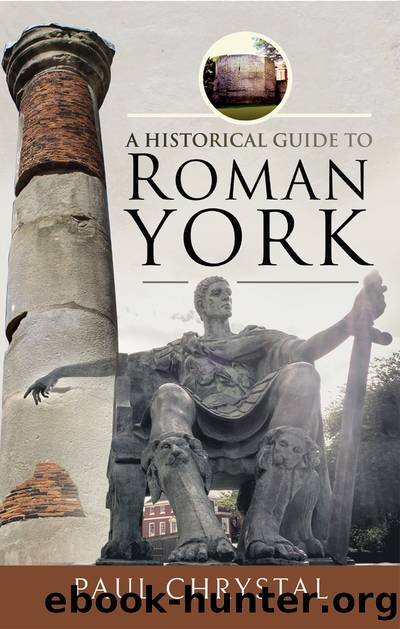A Historical Guide to Roman York by Paul Chrystal;

Author:Paul Chrystal; [Chrystal;, Paul]
Language: eng
Format: epub
ISBN: 9781526781284
Publisher: Casemate
Published: 2021-12-30T00:00:00+00:00
The Carausian Revolt
The Carausian Revolt (286â296) occurred when a somewhat dubious Roman naval commander, Carausius, declared himself emperor over Britain and northern Gaul, thus creating the Britannic Empire. In the end, his Gallic territories were retaken by Constantius Chlorus in 293 (Caesar of the West then Augustus; r. 293â306) after which Carausius was assassinated by his treasurer (rationalis) Allectus. Britain was brought back into the fold by Constantius and Asclepiodotus in 296.
Carausius, a Menapian of low birth, rose through the ranks of the Roman military and was appointed to a naval command in the Britannic fleet at Bononia-Gesoriacum (Boulogne), tasked with eradicating Frankish and Saxon raiders and pirates from the English Channel. When he got wind of the death sentence decreed on him by the emperor Maximian on charges of colluding with Frankish and Saxon pirates and embezzling recovered treasure, he responded by organising a coup, declaring himself emperor in Britain and taking control over the provinces of Britain and some in northern Gaul while Maximian was distracted with uprisings elsewhere. His not inconsiderable force comprised not only the fleet, augmented by new ships he had built, and the three legions stationed in Britain, but a legion he had appropriated in Gaul, a number of foreign auxiliary units, a levy of Gaulish merchant ships, and barbarian mercenaries attracted by the chance of booty.
An invasion in 288 to depose him failed due to bad weather, although Carausius claimed it as a military victory (Panegyrici Latini 10, 12,1; 8, 12, 2); Eutropius (Abridgement of Roman History 22) says that hostilities were in vain, thanks to Carausiusâ military skill; a ceasefire was agreed and an uneasy peace ensued, with Carausius obviously warming to his new status â minting coins and bringing their value into line with Roman issues as well as acknowledging and honouring Maximian and then Diocletian. Legends on the coins included Restitutor Britanniae (Restorer of Britain) and Genius Britanniae (Spirit of Britain) to win British support. Constantius responded with a medal struck after his victory, in which he described himself as redditor lucis aeternae, ârestorer of the eternal lightâ (i.e. of Rome).
In 293 Constantius, now the western Caesar, cut Carausius off by retaking the territory he had seized in Gaul. He besieged Bononia and invaded Batavia in the Rhine delta. After seven years of power Carausius was assassinated by Allectus, who took on the command.
In 296 the reconquest of Britain began. With Maximian holding the Rhine frontier, Constantius divided his fleet into several divisions. He led one division himself from Bononia; another, sailing from Le Havre, was commanded by Asclepiodotus, prefect of the Praetorian Guard. Asclepiodotusâ ships slipped past Allectusâ fleet, stationed off the Isle of Wight, in the fog. They landed near Southampton and burned their boats. The rebels were routed at Calleva Atrebatum (Silchester); Allectus himself was killed in the battle. Constantius, it seems, did not reach Britain until it was all over but he was welcomed by the Britons as a liberator (Panegyrici Latini 8, 19).
The Diocletian reforms
Download
This site does not store any files on its server. We only index and link to content provided by other sites. Please contact the content providers to delete copyright contents if any and email us, we'll remove relevant links or contents immediately.
The Daily Stoic by Holiday Ryan & Hanselman Stephen(3110)
The Fate of Rome: Climate, Disease, and the End of an Empire (The Princeton History of the Ancient World) by Kyle Harper(2872)
People of the Earth: An Introduction to World Prehistory by Dr. Brian Fagan & Nadia Durrani(2619)
Ancient Worlds by Michael Scott(2493)
Babylon's Ark by Lawrence Anthony(2430)
Foreign Devils on the Silk Road: The Search for the Lost Treasures of Central Asia by Peter Hopkirk(2388)
The Daily Stoic by Ryan Holiday & Stephen Hanselman(2344)
India's Ancient Past by R.S. Sharma(2295)
MOSES THE EGYPTIAN by Jan Assmann(2275)
The Complete Dead Sea Scrolls in English (7th Edition) (Penguin Classics) by Geza Vermes(2135)
Lost Technologies of Ancient Egypt by Christopher Dunn(2111)
The Earth Chronicles Handbook by Zecharia Sitchin(2101)
24 Hours in Ancient Rome by Philip Matyszak(1973)
Alexander the Great by Philip Freeman(1960)
Aztec by Gary Jennings(1878)
The Nine Waves of Creation by Carl Johan Calleman(1783)
Curse Tablets and Binding Spells from the Ancient World by Gager John G.;(1768)
Before Atlantis by Frank Joseph(1740)
Earthmare: The Lost Book of Wars by Cergat(1715)
